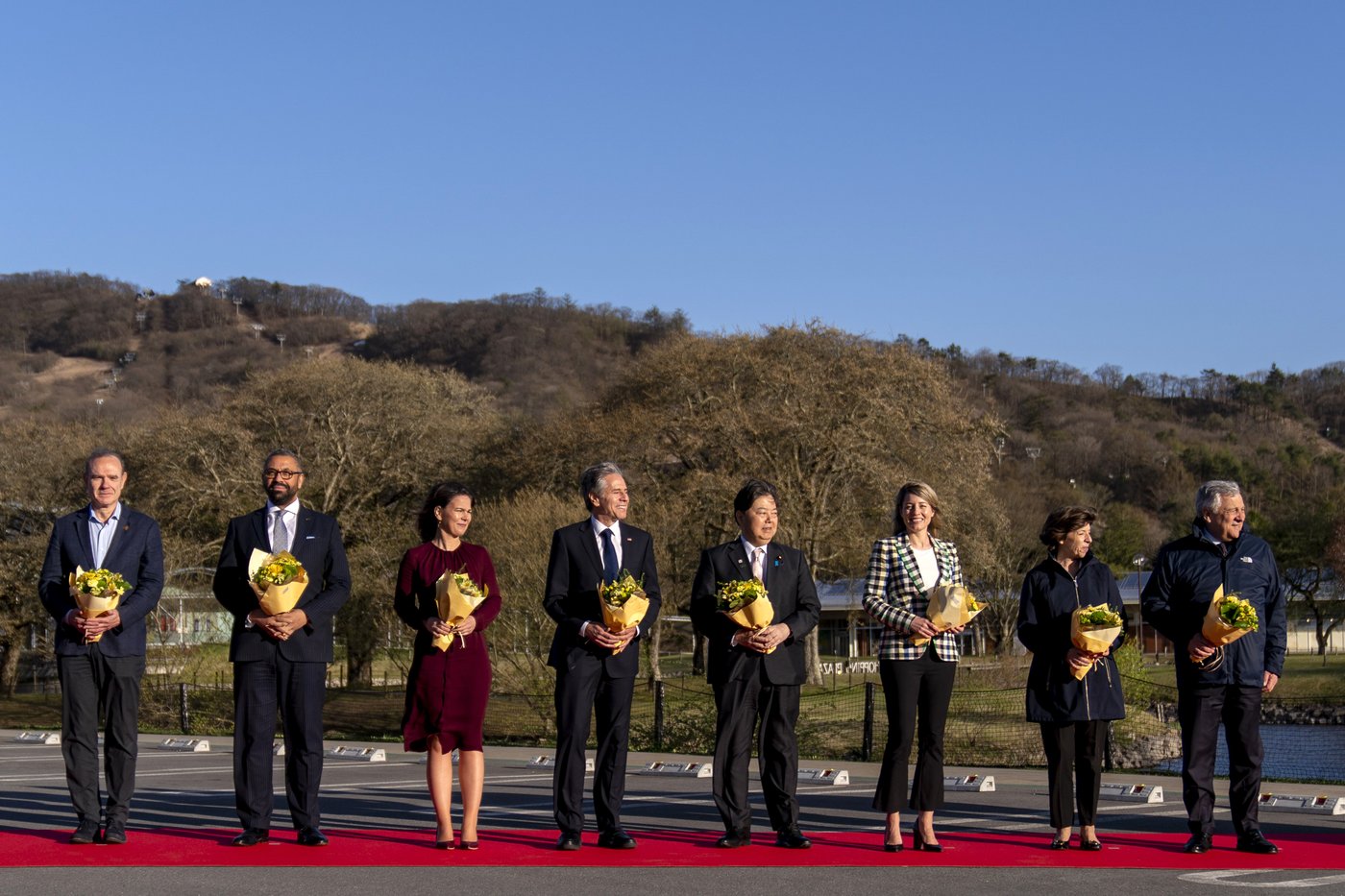
From left, European Union Deputy Secretary General and Political Director of the European External Action Service Enrique Mora, British Foreign Secretary James Cleverly, German Foreign Minister Annalena Baerbock, U.S. Secretary of State Antony Blinken, Japan’s Foreign Minister Yoshimasa Hayashi, Canada’s Foreign Minister Melanie Joly, France’ Foreign Minister Catherine Colonna, and Italy’s Foreign Minister Antonio Tajani, pose for members of the media as they arrive at Karuizawa Station for a G7 Foreign Ministers’ Meeting in Karuizawa, Japan, Sunday, April 16, 2023. THE CANADIAN PRESS/AP-Andrew Harnik
![]()
By Laura Osman in Ottawa
Environment and energy ministers from G7 countries wrapped two days of talks in northern Japan on Sunday without acting on Canada’s push to set a timeline for phasing out coal-fired power plants.
In their 36-page communique after the meeting in Sapporo, the ministers restated their commitment to reaching net-zero greenhouse gas emissions by 2050 at the latest, and promised to work with other countries to end new coal-fired power projects that don’t take steps to mitigate emissions.
“We call on and will work with other countries to end new unabated coal-fired power generation projects globally as soon as possible to accelerate the clean energy transition in a just manner,” the document says.
Canada’s Environment Minister Steven Guilbeault told the Japanese public broadcaster last week that he hoped to see “strong language” in the final statement about the phaseout of coal.
The leaders instead reaffirmed they need to achieve a “predominantly decarbonized power sector” by 2035.
In a statement posted to Twitter Sunday, Guilbeault said he still welcomed the shared commitment between G7 countries to accelerate coal phaseout, but also called for greater urgency.
#G7Sapporo pic.twitter.com/QrpumP3Yff
— Steven Guilbeault (@s_guilbeault) April 16, 2023
“For Canada, phasing out coal-fired electricity generation by 2030 has never been so urgent,” the statement reads.
“Science is clear, countries, in particular G7, must do more and on a faster timeline to address climate change and keep the Paris Agreement temperature goal in reach.”
In the 2015 Paris accord, 196 countries, including Canada, agreed to set national targets to cut greenhouse gas emissions en route to preventing the planet from warming up more than two degrees Celsius on average compared with pre-industrial levels.
Guilbeault has advocated for consensus on phasing out coal by 2030, as Canada has promised to do, but G7 environment ministers have struggled to find common ground on the issue as countries like Japan continue to rely on coal-powered electricity.
Japan advocated instead for it’s own natural strategy that includes the use of what the country calls “clean coal,” where the emissions are captured.
A report released earlier this month by the Global Energy Monitor — a group that tracks global energy projects — found G7 countries account for 15 per cent of the world’s operating coal capacity.
Last year the global capacity to burn coal for power grew, though that was mainly because so many new plants opened in China that it offset efforts to shut them down in other parts of the world, the report said.
“The truth is, coal is the number one low hanging fruit that needs to be replaced sooner than later,” said Andrew Weaver, a climate-change policy researcher and professor at the University of Victoria.
Weaver, who formerly led British Columbia’s Green Party, criticized the G7 for failing to deliver strict timelines to phase out coal-powered electricity and instead pointed to its 2050 net-zero pledge.
“Not a single person at that table will be able to be held accountable for not making that target, because it’s way beyond their political lifetimes, which is why it’s utterly meaningless,” he said.
The Sapporo talks also yielded pledges to co-operate on wise and equitable environmental energy, water, farm and marine policies.
“I believe that we were able to demonstrate to the international community that our commitment to climate change and environmental issues is unwavering, even in the context of the situation in Ukraine,” Akihiro Nishimura, Japan’s environment minister, said after the talks ended.
The ministers also committed to ending plastic pollution, aiming to take new plastic pollution to zero by 2040 as part of their priorities ahead of the G7 leaders’ summit in Hiroshima in May.
This report by The Canadian Press was first published April 16, 2023.
— With files from The Associated Press
- 0100 Turnbull Project Manager0100 Turnbull Project Manager
- 0099 Mryglod Steel 1080p0099 Mryglod Steel 1080p
- 0097 Eagle Sky Ventures LTD0097 Eagle Sky Ventures LTD
- 0095 Fast Trucking nearly 70 years good at it0095 Fast Trucking nearly 70 years good at it
- 0053 Kingston Midstream Westspur Alameda Click Before You Dig0053 Kingston Midstream Westspur Alameda Click Before You Dig
- 0092 Turnbull projects big and small0092 Turnbull projects big and small
- 0046 City of Estevan This is Estevan Teaser0046 City of Estevan This is Estevan Teaser
- 0087 Lori Carr Coal Expansion0087 Lori Carr Coal Expansion
- 0077 Caprice Resources Stand Up For Free Speech0077 Caprice Resources Stand Up For Free Speech
- 0076 Latus only0076 Latus only
- 0061 SIMSA 2024 For Sask Buy Sask0061 SIMSA 2024 For Sask Buy Sask
- 0055 Smart Power Be Smart with your Power office0055 Smart Power Be Smart with your Power office
- 0051 JML Hiring Pumpjack assembly0051 JML Hiring Pumpjack assembly
- 0049 Scotsburn Dental soft guitar0049 Scotsburn Dental soft guitar
- 0041 DEEP Since 2018 now we are going to build0041 DEEP Since 2018 now we are going to build
- 0032 IWS Summer hiring rock trailer music
- 0022 Grimes winter hiring
- 0021 OSY Rentals S8 Promo
- 0018 IWS Hiring Royal Summer
- 0013 Panther Drilling PO ad 03 top drive rigs
- 0006 JK Junior
- 0002 gilliss casing services0002 gilliss casing services
- 9002 Pipeline Online 30 sec EBEX9002 Pipeline Online 30 sec EBEX
- 9001
